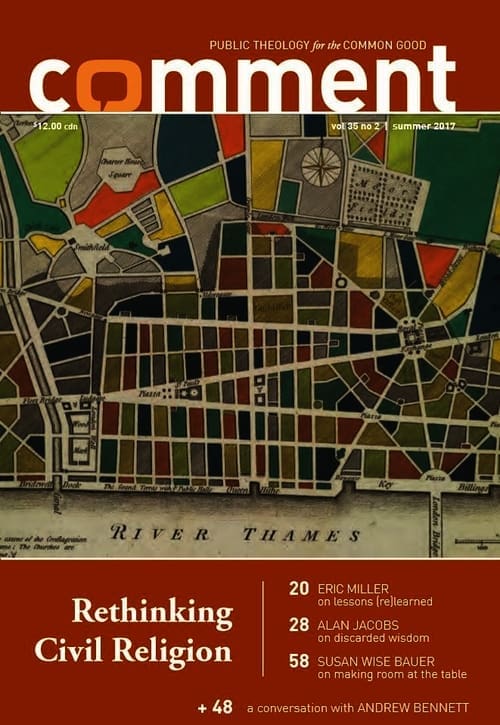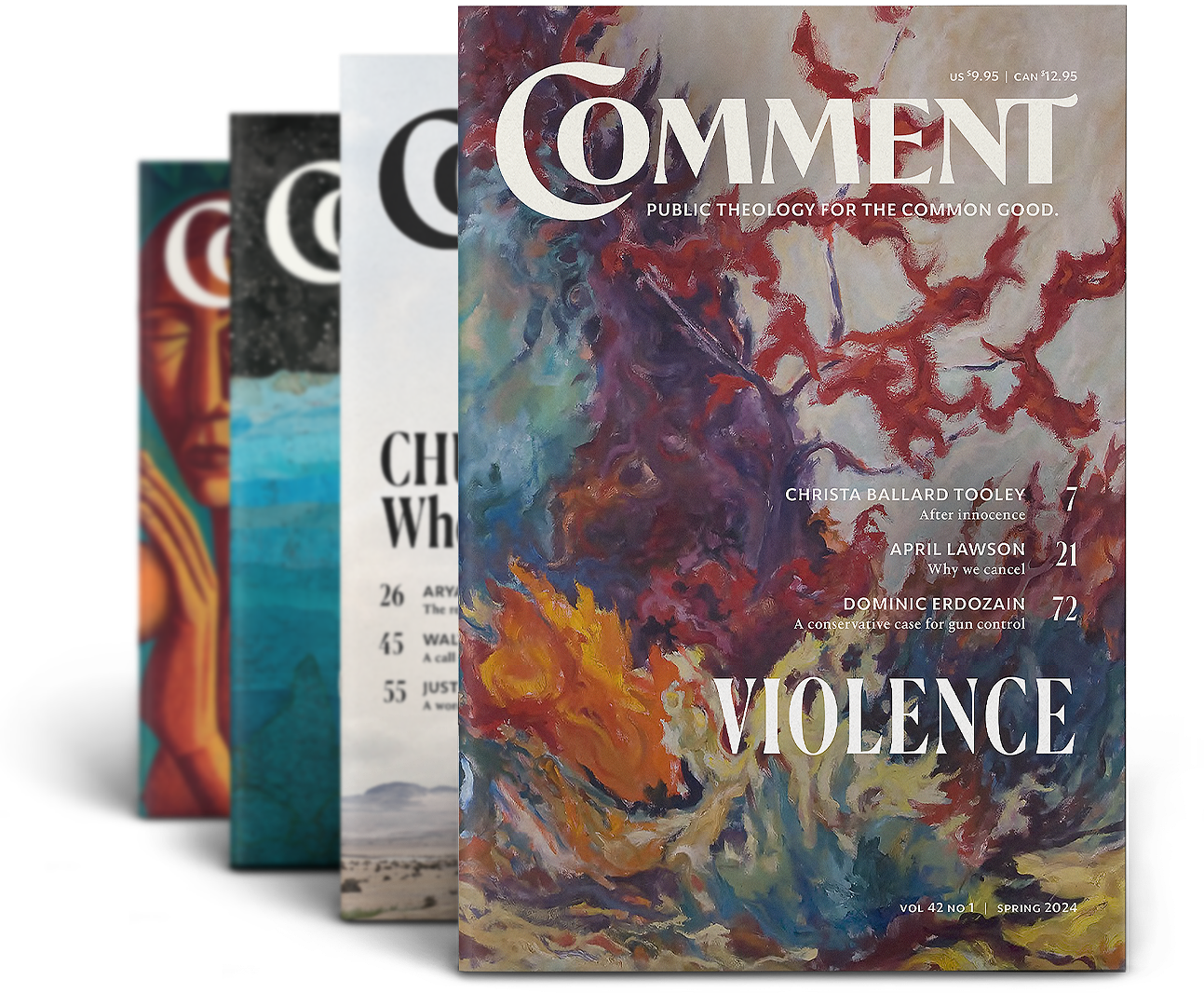Both secular liberals and (at least a subset of) Christian theologians seem to agree: something called “civil religion” got us in this mess. For some Christian theologians—and an increasing number of young Christian activists—the assimilation of North American Christians to the multiple cultural disorders of consumerism, militarism, and “earthly city” politics all fall under the long shadow of Constantine. The unique (and hopefully prophetic) witness of the church was ceded precisely when Christianity seemed to receive the imprimatur of the empire. Civil religion, then, is the strange brew that results when Christianity gets mixed up and confused with the state. On this account, “civil religion” is the end of true religion; it’s the name we give our compromise and assimilation.
This is mirrored by the secularist spin on civil religion that protests the intrusion of religion into matters of the state. Religion, as Richard Rorty put it, is an undemocratic “conversation stopper.” But the critique is even more strident than that: any religion that shows itself in public is an unwelcome guest that makes liberalism uncomfortable. It’s like a deposed leader making his way home: everybody assumes he’s only there because he wants to be in charge again. On this secularist, liberal account, “civil religion” is just cover for cultural imperialism, a nostalgic longing for a time when WASPs ruled the world. There’s nothing “civil” about it, the secularist complains: religion is a threat to civility, unleashing the culture wars that have ravaged the public square. For the secularist, civil religion is just the wolf of hegemony disguised in the Lamb’s clothing.
To these critical takes we might add a third sense of the term: civil religion is what we get when we divinize the civitas, when devotion to “the nation” trumps other allegiances and inspires a fervor and passion that is nothing short of religious. David Gelernter names this in his 2007 book, Americanism: The Fourth Great Western Religion. Walter McDougall’s more recent book The Tragedy of U.S. Foreign Policy, which Robert Joustra reviews in this issue, identifies the same problem in its subtitle: How America’s Civil Religion Betrayed the National Interest. In McDougall’s argument, civil religion carries the usual whiff of irrationality: the hard-nosed rationality of national interests is compromised because of vaunted values and misguided mythologies.
Across the board, then, it seems that civil religion is a problem. But we want to suggest there are still other expressions of civil religion that deserve serious consideration because, as implausible as it might seem, civil religion is an irreplaceable moral source of civil society. And conversely, the biblical vision of our human calling to tend the earth and love our neighbours—a calling that is renewed by the gospel, not superseded—propels us into social concern for the societies in which we find ourselves. The church sends us into the world as agents of renewal.
In fact, reconsidering civil religion is necessary precisely because civil religion is inevitable. It’s not a question of whether we have a civil religion, but which. As Jonathan Chaplin says in his conversation with Brian Dijkema in this issue, “Civil religion comes in different forms. Some are menacing. Some are totalitarian. Some are only modestly hegemonic. Some are almost invisible.” And it might be other forms of more intentional civil religion that can deliver us from the civil religions that worry us.
We’d go further and assert that thick, particular, unapologetic religious communities are exactly what we need to sustain a healthy civil society and foster civil public discourse. As James Davison Hunter has argued in The Death of Character, there are no “generic” values. Morality is always situated, and virtues are “caught” in specific communities, with specific narratives that fund a specific vision of the good. The envisioned good of a diverse, pluralistic, yet civil society that liberal democracies hope for is not a generic vision. It has a particular history—rooted in Christianity—and demands particular virtues. In short, the very project of a well-functioning, pluralistic, liberal society depends on the formative power of tradition-specific, “illiberal,” non-democratic communities that can inculcate virtues of hope, respect for dignity, commitment to truth, and more. Families, synagogues, churches, mosques embed their members in a Story that makes such virtues “make sense.” These non-political spheres of society cultivate people who become the sorts of citizens who know how to be patient and forgiving precisely because they believe in something beyond the state.
So the irony is that what liberal democracy wants—neighbour-concern, civility, and tolerance in a pluralistic society—depends on what liberal democracy now seems to want to exclude: thick, particularistic religious communities that inculcate Christlike virtues in citizens. Western liberal democracies have lived off the borrowed capital of the church for centuries. As Charles Taylor (A Secular Age), Oliver O’Donovan (Desire of the Nations), and even Jürgen Habermas have pointed out, the vision of a tolerant, civil, pluralistic democracy is itself the outworking of a biblical vision of love of neighbour. Furthermore, cultural commentators like Robert Putnam (Bowling Alone), Charles Murray (Coming Apart), Margaret Somerville (The Ethical Imagination), and Yuval Levin (The Fractured Republic) have pointed out that increasing inequality, loneliness, and segregation can be correlated with a de facto secularization in North American society. What if many of the goods of a liberal, even “secular” society need religious communities as their lifeblood?
This is why religious communities, especially the church, have a civil role to play. This doesn’t mean the church should become a functionary of the state, a mere chaplain to society. But one of the by-products of a healthy church forming citizens of kingdom come is that they are then sent into the earthly city with Christlike virtues that also contribute to the common good. We might miss this because it doesn’t primarily play itself out on a national scale; rather, it is enacted at the parish level, in a thousand different neighbourhoods. There we also find Christians, Jews, and Muslims collaborating for the sake of the vulnerable, the lonely, and the marginalized while also nourishing the virtue incubators we call families. Indeed, as Matthew Kaemingk argues in a provocative essay in this issue, “The Muslim schoolgirl who walks into her classroom with a simple scarf atop her head is performing a critical democratic function—one we should all be thankful for.” Religion in public—and religions that care about the public—are not the enemies of democracy; they are the incubators of patience and collaboration in the midst of deep difference. The thick particularity of confessional religion is the antidote we need to stem the rising intolerance of secularism as our de facto (intolerant) civil religion.
So even in this “earthly” sense, the church might be the hope of the world. This issue is an invitation to both believers and skeptics to consider an unpopular thesis: that if the civitas is going to be sustained, it might need to “get religion.” Maybe it’s time to reimagine civil religion.




